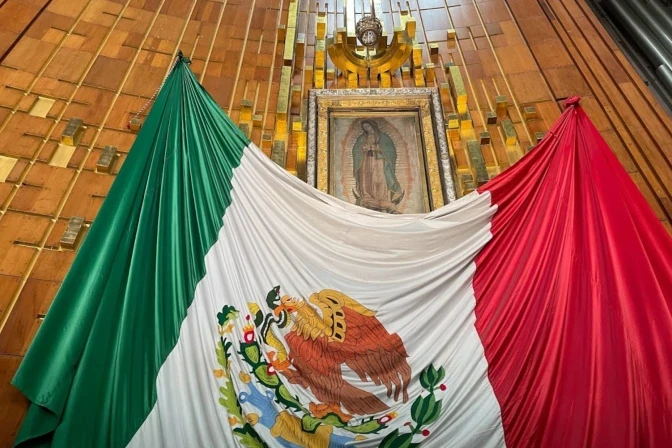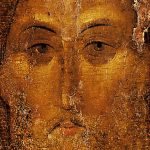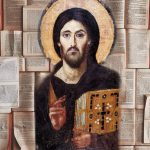
ACI Prensa Staff, Sep 17, 2025 / 08:00 am (CNA).
In a country “bled dry by violence, confused by ideologies, and threatened in its institutions,” the Catholic Church offered a prayer “to God and to our Most Holy Mother of Guadalupe”: “Long live Mexico!”
The Mexican Bishops’ Conference made the prayer in their most recent statement on the occasion of the Mexican national holiday, which commemorates the beginning of the country’s struggle for independence on Sept. 16, 1810.
Noting that the proclamation “Long live Mexico!” would be heard in the main squares of cities across the country commemorating the “Grito de Dolores” (Cry of Dolores) with which Catholic priest Miguel Hidalgo initiated the drive for independence from Spain, the bishops said this slogan would be chanted by Mexicans “in every corner of Mexico, and without a doubt, Catholics will unite to exclaim from the heart: ‘Long live Mexico!’”
However, they clarified, “for us, this exclamation is not a cry of celebration but a profound prayer to God and to our Most Holy Mother of Guadalupe.”
In their message, the bishops called for the country to respect the lives of children “from conception; that they be provided decent conditions for development; that their innocence not be darkened by ideologies that confuse their hearts.”
For young people, the bishops asked “that they be offered opportunities to pursue their dreams with equity and justice; that they be rescued from the clutches of drugs and violence; that Mexico shines by the ingenuity, bravery, and courage of its young people.”
They also demanded that Mexican women be provided with “safe, respectful, and equitable spaces; that their dignity, gifts, and potential be valued; that their motherhood and their irreplaceable ability to educate our children be respected; that they be offered opportunities for development and advancement.”
They also called for “every family to discover its vocation to be a school of life, respect, and love; that families live free from violence and become promoters of peace.”
Violence in Mexico
According to the Spanish-language report “MX: The War in Numbers,” in the first 11 months of the current Mexican President Claudia Sheinbaum’s administration, there have been 24,696 homicides. However, a downward trend has been observed compared with the six-year term of her predecessor, Andrés Manuel López Obrador, founder of the National Regeneration Movement (MORENA) party of which Sheinbaum is a part, who ended his term having had the most violent period in modern Mexican history with 199,970 homicides.
These figures appear to confirm the trend recorded by the Mexico 2025 Peace Index, which recognizes that “peace in Mexico improved by 0.7% in 2024, marking the fifth consecutive year of moderate improvement after four years of pronounced deterioration.”
However, alongside the decrease in homicides, another figure continues to rise: disappearances.
“A growing trend of people reported missing has been identified throughout the country,” the report states. “Since 2010, approximately 292,000 cases of disappeared persons have been recorded in Mexico, and more than half of these cases occurred in the last six years,” it adds.
Along with violence, primarily linked to organized crime, the shadow of corruption allegations looms over Mexico. In recent weeks, the scandal of the so-called “fiscal huachicol,” a network smuggling fuel into the United States, appears to involve businessmen, customs authorities, and military officials.
Amid this reality, Sheinbaum became the first female president of Mexico to perform the “Grito de Dolores” from the balcony of the National Palace on the evening of Sept. 15.
‘Realities that overshadow any data or figure’
Father Omar Sotelo, priest, journalist, and director of the Catholic Multimedia Center — which tracks how violence affects the Catholic Church in Mexico — lamented that Sheinbaum’s administration “has relied on an opaque reality, going back and forth between data and figures, when reality hits us hard.”
“They tell us that homicides have decreased, but disappearances are increasing. They tell us there is no corruption, and now, unfortunately, we find this corruption occurring with the infamous ‘huachicol’ [stealing fuel]; the Navy being involved in these types of situations, commanders who continue to be obviously infiltrated by organized crime and who are being arrested.”
“These are realities that overshadow any data or figure,” he pointed out to ACI Prensa, CNA’s Spanish-language news partner.
Sotelo noted that Sheinbaum has had the “historic” opportunity to establish “her own style,” distancing herself “from the commitments that possibly led her to the presidency.”
This, he said, meant recognizing that “obviously, criminality, organized crime, have overwhelmed us.”
Accepting this reality, he insisted, “is simply saying that we are analyzing and accepting that we need to change,” because “we cannot deny that the reality is one of rampant violence, that attacks on every side, in every direction, and that comes from many sectors and has infiltrated high levels of government.”
Mexico’s hope
However, Sotelo resists despair: “We must know that we are not prophets of doom and that we must always keep our eyes on the hope of always improving and always trying to move forward.”
“I think it’s important to recognize that Mexico is a great country. We cannot forget that,” he emphasized.
Politicians must be willing to “accept this reality before justifying it. That will be the first step toward the transformation of the Mexico we truly want to celebrate.”
The director of the Catholic Multimedia Center also pointed out that the Catholic Church has a dual responsibility: “to denounce that which goes against the Gospel,” such that “we must be the first to promote a denunciation [of evils] that rebuilds dignity and trust. And that means not remaining silent.”
This, he emphasized, contrasts with the maneuvers of criminal groups: “Organized crime sometimes muzzles us; it has kept us silent, and that is what it wants: to maintain a silent and submissive population.”
The Catholic faithful also have a responsibility in this work of peace, he added, because each one must “fully embrace Christianity,” remembering that “we go to Mass to recognize the master Jesus Christ, to fill ourselves with him and then spread that love of Jesus Christ to every corner of the world, so that we can transform what is arid today, what has fallen today, what has become bloody today.”
The family and the fight against ‘narcoculture’
The priest and journalist also warned of how organized crime has permeated the so-called “narcoculture” in Mexican society, presenting the life of drug trafficking as “something to aspire to.”
In this way, he warned, criminals attract young people “with the intention of their becoming cannon fodder and tomorrow being used and then tossed in the garbage.”
“Only the family can fight this narcoculture that is invading our communities, that is invading social media,” he stated.
“Today we must reaffirm emphatically that the family is where the authentic citizen of values is born, where the authentic Christian is born, and where the next saint will be born,” he emphasized, recalling the recent canonization of young people Pier Giorgio Frassati and Carlo Acutis. “We must reclaim the strength of a family that will once again generate worthy and responsible men, dedicated Christians, and potential saints.”
This story was first published by ACI Prensa, CNA’s Spanish-language news partner. It has been translated and adapted by CNA.
If you value the news and views Catholic World Report provides, please consider donating to support our efforts. Your contribution will help us continue to make CWR available to all readers worldwide for free, without a subscription. Thank you for your generosity!
Click here for more information on donating to CWR. Click here to sign up for our newsletter.














